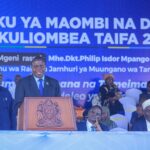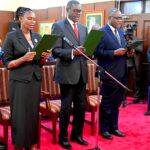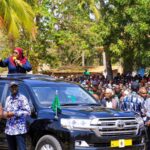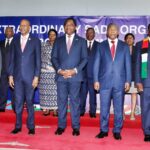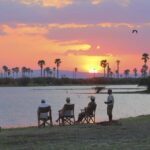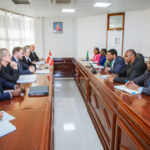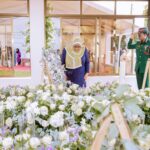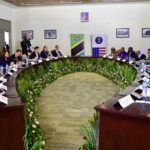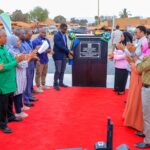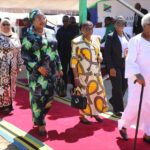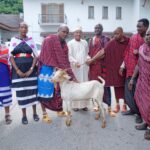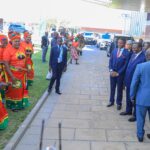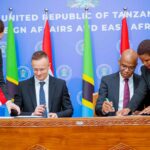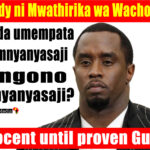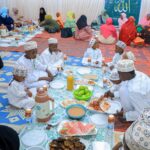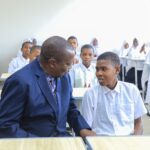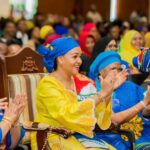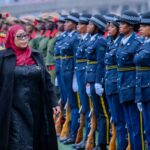Celebrating the Pillars of Democracy: World Press Freedom Day Launch by Dr Tulia Ackson
In the heart of Dodoma, at the Jakaya Kikwete Conference Centre, a momentous occasion unfolded as the esteemed Speaker of the Parliament of the United Republic of Tanzania, Dr Tulia Ackson, stood before a gathering of journalists, media professionals and free speech advocates to launch World Press Freedom Day on 2 May 2024. 
Tanzania Media explores the significance of the event, the role of press freedom in a thriving democracy, and the challenges and triumphs faced by the media in Tanzania and beyond.
The essence of press freedom:
Freedom of the press is the cornerstone of any democratic society. It is the freedom to discuss, disseminate and debate without fear of retribution or censorship. Dr Tulia Ackson’s presence at the launch symbolised the Tanzanian government’s commitment to upholding these ideals. The event not only celebrated the fundamental human right to freedom of expression, but also served as a reminder of the ongoing struggle to maintain transparency and accountability in governance through an unfettered press.
The role of the media in democracy:
A free press serves as a watchdog, a gatekeeper and a forum for public debate, playing a critical role in informing citizens and enabling them to make informed decisions. Dr Ackson’s speech highlighted the indispensable role of the media in fostering an informed electorate, which is essential for the functioning of a participatory democracy.
She emphasised the need for a media landscape that is diverse, independent and robust, capable of challenging the status quo and advocating for the public interest.
Challenges to press freedom:
Despite the celebrations, challenges to press freedom persist. Journalists face threats, intimidation and even violence because of their work. Legal restrictions, economic pressures and political interference often hinder the media’s ability to operate freely.
The Tanzanian context:
In Tanzania, the road to a fully free press has been fraught with obstacles. The government has at times been criticised for restrictive laws and practices that hinder journalistic freedom. However, Dr Ackson’s launch of World Press Freedom Day is a positive sign, suggesting a move towards greater openness and support for the media.
Global perspectives on press freedom:
The celebrations in Dodoma take place against a global backdrop where press freedom is under threat in many countries. The article compares Tanzania’s media environment with international standards and experiences, offering a broader view of the challenges faced by journalists worldwide. It also highlights the efforts of international organisations and campaigns working tirelessly to protect and promote press freedom around the world.
Navigating the Media Landscape in Tanzania: Challenges and Global Perspectives
While Tanzania’s media environment reflects its own unique socio-political dynamics, it is not immune to the challenges journalists face globally. As the country strives to meet international standards, it is grappling with the complexities of press freedom, the treatment of journalists and the impact of digital media on traditional news outlets. We will briefly analyse the media landscape in Tanzania, drawing parallels with global experiences and highlighting the efforts of international organisations to safeguard press freedom.
The state of press freedom in Tanzania:
Tanzania, like many of its East African counterparts, has had a turbulent relationship with press freedom. Journalists in the region often work under the shadow of strict regulations, with the threat of harassment or legal repercussions looming over their reporting. The Tanzanian government has been criticised for enacting laws that, while ostensibly designed to maintain public order and protect national interests, can be used to stifle dissent and control media narratives.
International standards and experience:
The global media environment is a patchwork of varying degrees of freedom and restriction. International standards set by organisations such as the United Nations and the World Press Freedom Index serve as benchmarks for assessing and advocating for press freedom. These standards emphasise the importance of a free press in promoting democracy, accountability and the free exchange of ideas. Despite these guidelines, journalists around the world continue to face threats, censorship and violence.
Efforts to protect journalists:
Organisations such as Reporters Without Borders, the Committee to Protect Journalists and Amnesty International are at the forefront of the fight to protect journalists and promote press freedom. They monitor abuses, assist journalists in distress and campaign for the repeal of repressive laws. Their work is crucial in creating a safer environment for the press and holding governments to account for their actions.
Journalists in Africa:
The treatment of journalists in Africa varies widely, with some countries making significant strides towards openness and others maintaining a tight grip on the media. In Tanzania, journalists have been subjected to arbitrary arrest, intimidation and violence. The situation reflects a wider African context in which media professionals often risk their lives to report on corruption, human rights abuses and political unrest.
Press freedom in East Africa:
East Africa presents a mixed picture of press freedom. While some countries have made progress, others, including Tanzania, have seen a decline in recent years. The region’s media landscape is influenced by political changes, economic pressures and social dynamics, all of which contribute to the complex interplay between governments and the press.
The state of freedom of expression in Africa: A delicate balance
In the rich tapestry of African cultures, where vibrant traditions and diverse histories intertwine, the concept of freedom of expression often finds itself in a complex dance with societal norms and governance. The right to speak one’s mind, to criticise and to question authority is a cornerstone of democratic societies worldwide. In many African countries, however, this right is not absolutely guaranteed. The delicate balance between cultural values and the exercise of freedom of expression is an issue that merits nuanced exploration, especially as it affects the lives of citizens who may face severe consequences for their words.
Cultural context and historical perspectives:
The African continent is home to a variety of cultures, each with its own set of values and expectations regarding public discourse. In many traditional societies, respect for elders and adherence to established norms is paramount. The culture of criticism and questioning that is so integral to the concept of freedom of expression can be seen as a challenge to these age-old values. This cultural background sets the stage for the way in which freedom of expression is perceived and practised across the continent.
Historical factors also play a significant role in shaping the current state of freedom of expression in Africa. Colonial legacies, struggles for independence and the fight against oppressive regimes have all influenced the way in which freedom of expression is understood and valued. In some cases, the struggle for liberation included a struggle for the right to speak freely, while in others post-independence governments adopted restrictive practices to consolidate power and control narratives.
Government influence and restrictions:
The role of government in regulating and restricting speech cannot be overstated. Across Africa, many governments have been criticised for their heavy-handed approach to dissent. Laws criminalising defamation, sedition and the dissemination of “false news” are often used to silence critics and stifle debate. Journalists, activists and ordinary citizens alike can face imprisonment, fines or worse for speaking out against those in power.
The use of such laws is not uniform across the continent, and there are indeed African countries that have made progress in protecting and promoting freedom of expression. However, the majority face challenges in this regard, with governments exerting considerable influence over the media and public discourse. The suppression of freedom of expression not only affects individuals, but also hinders the development of robust civil societies and democratic institutions.
The cost of speaking out:
The personal cost of exercising freedom of expression in an environment that does not fully support it can be high. Individuals who choose to speak out against corruption, human rights abuses or government policies can face dire consequences. Imprisonment, threats to personal safety and forced exile are among the risks associated with expressing dissent. In addition, the social and financial consequences of being labelled a troublemaker or an enemy of the state can be devastating, leading to ostracism and economic hardship.
Despite these risks, there are many courageous individuals and organisations across Africa who continue to advocate for greater freedom of expression. Their efforts are crucial in pushing the boundaries of what is acceptable and holding governments to account for their actions.
The way forward:
The future of freedom of expression in Africa is not predetermined. It will be shaped by the actions of governments, civil society and individuals committed to the principles of open dialogue and democratic governance. Education and awareness-raising about the importance of freedom of expression, as well as support for those persecuted for their words, are essential components of this process.
International attention and pressure can also play a role in encouraging African governments to respect and protect the right to freedom of expression. However, such efforts must be sensitive to the cultural and historical context of each nation and avoid a one-size-fits-all approach.
The threat of digital media to traditional media:
The rise of digital media has revolutionised the way news is consumed in Tanzania. Social media platforms and online news outlets have challenged the dominance of traditional media, resulting in a competitive and fragmented media space. While digital media offers opportunities for greater reach and engagement, it also poses significant threats, including the spread of misinformation and the financial destabilisation of traditional news organisations.
The future of press freedom:
Dr Ackson’s message of hope and resilience serves as a call to action for governments, media professionals and citizens to ensure press freedom for future generations. The launch of World Press Freedom Day by Dr Tulia Ackson at the Jakaya Kikwete Conference Centre was more than a ceremonial event; it was an affirmation of the essential role that a free and independent press plays in society.
Freedom of expression in Africa is a complex issue, deeply intertwined with cultural values, historical experiences and contemporary political realities. While there are significant challenges to overcome, the continent is not monolithic, and there are examples of progress and resilience that offer hope for the future. It is through continued dialogue, advocacy and the courageous actions of individuals that the right to speak freely will be advanced in Africa. The journey towards a continent where every voice can be heard without fear is an ongoing one that requires the collective efforts of all who value the principles of freedom and democracy.
As we reflect on the issues discussed in this article, it is clear that the pursuit of press freedom is an ongoing endeavour that requires vigilance, courage and collective effort. Let us honour the spirit of World Press Freedom Day by committing ourselves to the principles of transparency, accountability and open discourse, for these are the pillars upon which a vibrant and democratic society rests.
Happy World Press Freedom Day!
Tanzania Media
- Kanyala Ferry Launch: TEMESA’s New Service for 15,000 Sengerema Residents (Mwanza) - 18 August 2025
- Russia-Tanzania Naval Cooperation: How the Smolny Training Ship Boosts Dar es Salaam’s Maritime Security - 18 August 2025
- Tanzania’s ICGLR Commitment: Stabilising the DRC & Great Lakes Region - 18 August 2025







